Tile Grout
Tile grout. How exciting – right? When completing a kitchen, bathroom, or interior remodeling project, I have never had a client express an interest in grout. With the exception of color, grout is grout – right? Grout is not grout. In fact, grout is a critical material in the proper installation and durability of tile.
What is Tile Grout?
Tile grout is a mixture of cement powder and water that creates a porous paste. It is specially formulated to form a bond between tiles and make showers, bathtubs, and floors strong and watertight. For most residential projects, there are 2 kinds of grout: sanded and smooth. There are 4 types of grout. These are:
- Polymer modified cement based.
- Calcium aluminate cement based.
- Single component cement-epoxy based.
- Epoxy-based.
|
|
|
|
What is the Best Tile Grout?
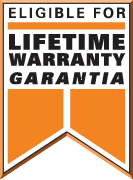 There are 3 primary manufacturers of residential grout: Custom®, MAPEI®, and Laticrete®. My preference is Custom. In fact, I only use Custom grouts. Why? It is dependable and its color performance is outstanding. Custom grout is well known for its rock-solid durability, quality, and ease of use. It has the most comprehensive selection of colors and grout solutions.
There are 3 primary manufacturers of residential grout: Custom®, MAPEI®, and Laticrete®. My preference is Custom. In fact, I only use Custom grouts. Why? It is dependable and its color performance is outstanding. Custom grout is well known for its rock-solid durability, quality, and ease of use. It has the most comprehensive selection of colors and grout solutions.
Custom’s exceptional customer service and unequaled quality control since 1964 have made their reputation stand out in the tile industry. In over 45 years, I have never had a problem with a Custom product. Many of their products are eligible for a lifetime warranty.
If you have a shower, tub, or floor where the grout is coming out, your installer either did not use Custom grout or they installed it wrong. Installation is the number one reason grout fails. The second reason grout fails is the client. Most clients are not properly instructed on how to clean and maintain their tile grout.
Installation Tile Grout Failure
If the proper tools and methods are not used, the grout will not perform. Here are the most important considerations when grouting.
 Tools – Installing tile grout requires the following tools:
Tools – Installing tile grout requires the following tools:- Clean 5-gallon buckets. Using dirty or well used buckets will stain the grout and give it a dirty and/or splotchy look.
- Two new grouting sponges. These are not regular sponges!
- Heavy latex or nitrile water proof gloves.
- Various size non-stick gum rubber tile floats in good condition.
- Application – This requires years of supervised experience. It is not as simply as it looks. There is a right and wrong way to grout. Get it wrong and it will fall out and/or fail. Other than a water leak, moisture behind tile is almost always a grouting, tile, and/or thinset process application failure.
 Tile setting drying time – This is critical. If the cement substrate base or thinset is not permitted to dry prior to grouting, you will have a problem. Most tile installers want to finish the job, get paid, and move on. Although this “speed” typically lowers the cost of your tile job, it absolutely reduces the performance and durability of your grout and tile. Grout must dry prior to using your new bathtub or shower. Moreover, grout must thoroughly dry prior to applying grout sealer.
Tile setting drying time – This is critical. If the cement substrate base or thinset is not permitted to dry prior to grouting, you will have a problem. Most tile installers want to finish the job, get paid, and move on. Although this “speed” typically lowers the cost of your tile job, it absolutely reduces the performance and durability of your grout and tile. Grout must dry prior to using your new bathtub or shower. Moreover, grout must thoroughly dry prior to applying grout sealer.
What About Sealing Tile Grout?
Sealing – Higher quality grout does not require sealing. Most tile installers will use the least expensive grout to save a few bucks. However, tile installers rarely seal the tile and grout (even if they say they did). When they do, it is usually while the grout is still wet using a product mostly made of water. This 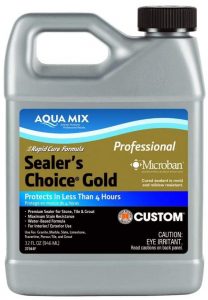 accomplishes nothing. In fact, this is worse than not sealing the tile. Why do they do this? If they waited until the grout was dry, they would need to return another day. This delays the job (and their payment) by at least several days. In remodeling, as with most things, time is money. Typically, grout needs 48-72 hours to dry prior to installing sealer.
accomplishes nothing. In fact, this is worse than not sealing the tile. Why do they do this? If they waited until the grout was dry, they would need to return another day. This delays the job (and their payment) by at least several days. In remodeling, as with most things, time is money. Typically, grout needs 48-72 hours to dry prior to installing sealer.
In my experience, the best tile and grout sealer by a wide margin is Aqua Mix® Sealer’s Choice® Gold. It is not cheap! But then again, quality and durability never are. This is a premium, no-sheen, natural look, penetrating sealer formulated to provide maximum stain protection. When applying, use very liberally and cover all tile and grout thoroughly. Grout sealer protects your grout so it’s water resistant and will repel moisture and germs. Sealing the grout helps prolong the look, texture, and consistency of your grout. It also prevents mildew and mold. Your grout will look better and last longer.
Epoxy grout is an exception. It is a tough, water-resistant material that doesn’t require sealer. Epoxy grout remains flexible, compared to cement-based grout, so it’s less susceptible to chips and cracks.
Grout should be re-sealed every six months depending on use.
Environment and Grout Failure
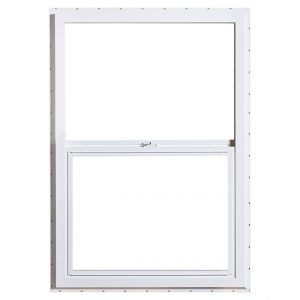
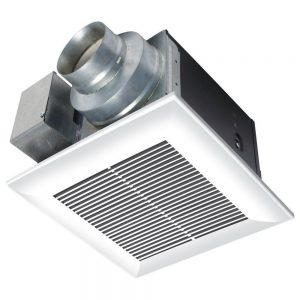 Do you have mold on your bathroom walls and ceilings? Is there mold growing on your tile and/or grout? Is your paint peeling, flaking, or blistering? If you answered “yes” to any of these, you have a ventilation problem. If you do not fix this, you will never resolve your mold problem.
Do you have mold on your bathroom walls and ceilings? Is there mold growing on your tile and/or grout? Is your paint peeling, flaking, or blistering? If you answered “yes” to any of these, you have a ventilation problem. If you do not fix this, you will never resolve your mold problem.
California Residential Code (CRC) requires a fan and a window in your bathroom. There is no grandfathering. If you have a window and no fan, you must add a fan. The opposite is also true. The only exception to this rule is if your bathroom cannot support the addition of a fan or window.
Do not buy a bathroom fan with less than 110 CFM (Cubic Feet per Minute) capacity. This works best for most Orange County bathrooms. The exhaust duct diameter must be 4”. Per CRC, the fan must also be on a humidistat sensor (also referred to as a condensation sensor).
If your bathroom is not properly ventilated and used correctly, all your warranties will be void! Moisture control is the client’s responsibility. Hire a highly experienced and knowledgeable licensed contractor and listen to what they say!
Cleaning and Grout Failure
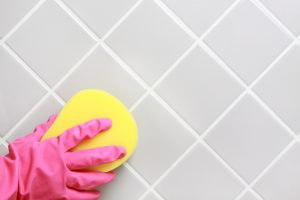 NEVER use any bleach or bleach product on grout! The same is true for high acidity products like vinegar. It will destroy the grout. Every grout manufacturer has their own cleaning requirements. The same is true for the type of grout. Don’t simply buy something at the store.
NEVER use any bleach or bleach product on grout! The same is true for high acidity products like vinegar. It will destroy the grout. Every grout manufacturer has their own cleaning requirements. The same is true for the type of grout. Don’t simply buy something at the store.
Check with the manufacturer. You will void every warranty (tile, grout, installation – everything) if you use the wrong cleaning products.
Here are a few remedies for cleaning grout:
 Hydrogen peroxide is safe to use on grout. It is a neutral cleaner that won’t eat away at the grout like vinegar can. Mixed with baking soda, hydrogen peroxide forms oxygenated bleach, and that chemical reaction safely cleans the surface. Use a small stiff-bristled cleaning brush (or stiff toothbrush) for difficult areas.
Hydrogen peroxide is safe to use on grout. It is a neutral cleaner that won’t eat away at the grout like vinegar can. Mixed with baking soda, hydrogen peroxide forms oxygenated bleach, and that chemical reaction safely cleans the surface. Use a small stiff-bristled cleaning brush (or stiff toothbrush) for difficult areas.- Pour some hydrogen peroxide into a spray bottle and spray the grout to get rid of mold and mildew. Reapply if necessary, scrub and rinse. You can also use a small stiff-bristled cleaning or tooth brush with the mixture and scrub the grout. Let the solution sit on the grout 2-5 minutes then rinse and wipe dry.
 CLR® Brilliant Bath (Formerly Called CLR Bath and Kitchen) is one of the best commercial products for cleaning white tile and grout. It is not for colored grout or stone! You should not have stone in your shower or bathtub anyway – it deteriorates with water.
CLR® Brilliant Bath (Formerly Called CLR Bath and Kitchen) is one of the best commercial products for cleaning white tile and grout. It is not for colored grout or stone! You should not have stone in your shower or bathtub anyway – it deteriorates with water.- Multipurpose and multi-surface cleaner that has a powerful foam spray formulated to quickly cut through dirt, calcium, lime, hard water deposits and soap scum. Will not remove rust.
- Use on most kitchen and bath surfaces including porcelain, ceramic tile, shower doors, sinks, bathtubs, white grout & caulk, toilet bowls, fiberglass, and kitchen countertops.
What is the Difference in Tile Grout?
This can get technical. I will try to keep it simple using a summary table format.
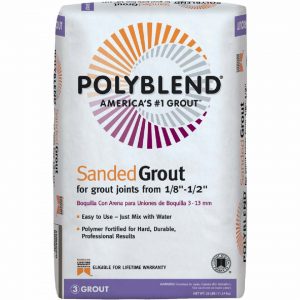
| 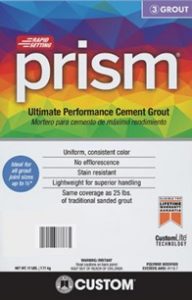
| 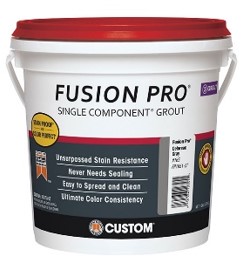
| 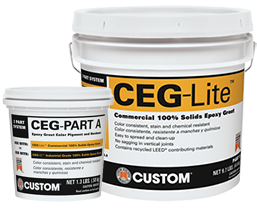
|
Can I Put New Grout Over Old Grout?
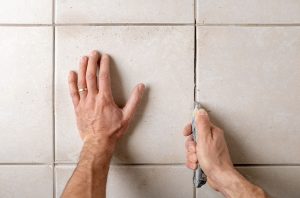 So, you are noticing that your grout seems to be separating, cracking, or crumbling? Often, when we look at what appear to be small issues with our home finishes, we jump to the Internet to search for repair solutions. Though, fissures in your grout are small, failing grout is no small problem. The question becomes…Can I put new grout over my old grout? The short answer is, “no.” You cannot put new grout over old grout.
So, you are noticing that your grout seems to be separating, cracking, or crumbling? Often, when we look at what appear to be small issues with our home finishes, we jump to the Internet to search for repair solutions. Though, fissures in your grout are small, failing grout is no small problem. The question becomes…Can I put new grout over my old grout? The short answer is, “no.” You cannot put new grout over old grout.
Once your grout begins to fail by cracking and crumbling, its time to re-tile. Removing the old grout and replacing with new is never more than a short-term solution. Water has already gotten behind the tile and grout. Don’t make the mistake of thinking you can simply replace the old grout. Doing this leaves water behind the wall. This moisture will create mold, mildew, bacteria, and other dangerous pathogens. Over time, these will destroy your home and possibly your health.
If you try adding new grout over your old grout, the new mixture will not properly adhere to the existing grout or tile edges. This leaves your shower or tub open to more water damage. If you attempt to add grout just inside cracks or areas of separation, the grout will simply cure and begin to break away – leaving you back where you started.
You will also notice that adding new grout will not be aesthetically pleasing. Why? Firstly, the new layer will be thin. This means that your old grout will be seen beneath. Secondly, if you were to only treat one area, you will see the difference between the “repaired” area versus the area where you did not add grout.
Always Hire a Reliable and Dependable Contractor to Remodel your Bathroom
 Always work with a trustworthy contractor like DAD’s Construction. We are experts in bathroom remodeling who can manage projects in an efficient manner. DAD’s Construction will do everything to minimize the possibility of change orders. Our team will make sure we have all the necessary information to prepare a proposal that meets your requirements. Rest assured that we will provide you with a detailed, by line-item contract. We will make sure that the contents of this agreement are properly and clearly communicated to you. If you have questions or need updates regarding your project, we will always answer your inquiries.
Always work with a trustworthy contractor like DAD’s Construction. We are experts in bathroom remodeling who can manage projects in an efficient manner. DAD’s Construction will do everything to minimize the possibility of change orders. Our team will make sure we have all the necessary information to prepare a proposal that meets your requirements. Rest assured that we will provide you with a detailed, by line-item contract. We will make sure that the contents of this agreement are properly and clearly communicated to you. If you have questions or need updates regarding your project, we will always answer your inquiries.
How Can I Receive More Information on Remodeling my Bathroom?
If you would like more information on enjoying the best bathroom, kitchen, and interior remodeling experience in Orange County, call Dan at (949) 380-0177 or at dan@dadsconstruction.com for a free in home consultation. DAD’s serves all of South Orange County California. This includes Lake Forest, Mission Viejo, Foothill Ranch, Portola Hills, Ladera Ranch, Irvine, San Clemente, Dana Point, San Juan Capistrano, Rancho Santa Margarita, Coto de Caza, Dove Canyon, Laguna Niguel, Laguna Hills, Newport Beach, and Aliso Viejo.
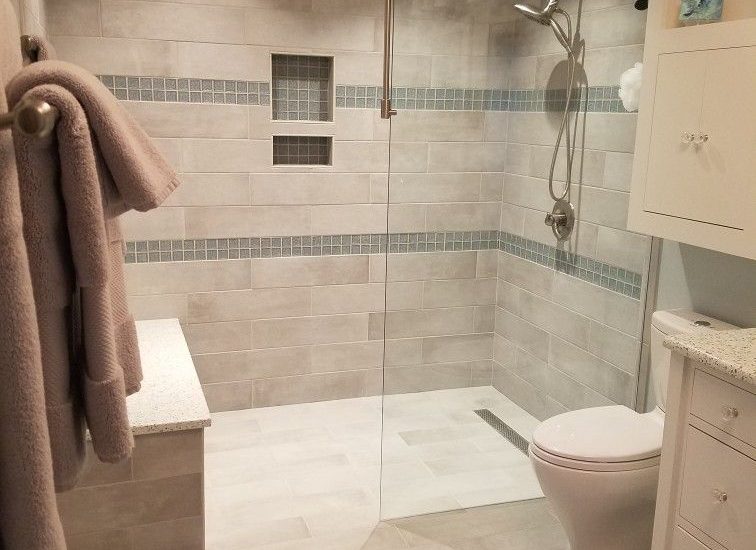
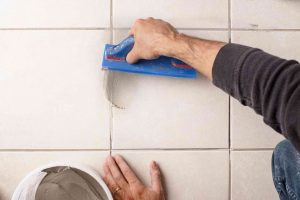 Tools – Installing tile grout requires the following tools:
Tools – Installing tile grout requires the following tools: Tile setting drying time – This is critical. If the cement substrate base or thinset is not permitted to dry prior to grouting, you will have a problem. Most tile installers want to finish the job, get paid, and move on. Although this “speed” typically lowers the cost of your tile job, it absolutely reduces the performance and durability of your grout and tile. Grout must dry prior to using your new bathtub or shower. Moreover, grout must thoroughly dry prior to applying grout sealer.
Tile setting drying time – This is critical. If the cement substrate base or thinset is not permitted to dry prior to grouting, you will have a problem. Most tile installers want to finish the job, get paid, and move on. Although this “speed” typically lowers the cost of your tile job, it absolutely reduces the performance and durability of your grout and tile. Grout must dry prior to using your new bathtub or shower. Moreover, grout must thoroughly dry prior to applying grout sealer.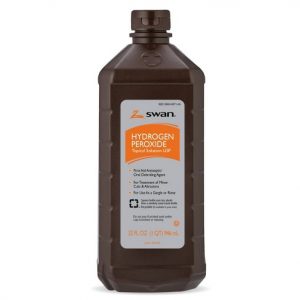 Hydrogen peroxide is safe to use on grout. It is a neutral cleaner that won’t eat away at the grout like vinegar can. Mixed with baking soda, hydrogen peroxide forms oxygenated bleach, and that chemical reaction safely cleans the surface. Use a small stiff-bristled cleaning brush (or stiff toothbrush) for difficult areas.
Hydrogen peroxide is safe to use on grout. It is a neutral cleaner that won’t eat away at the grout like vinegar can. Mixed with baking soda, hydrogen peroxide forms oxygenated bleach, and that chemical reaction safely cleans the surface. Use a small stiff-bristled cleaning brush (or stiff toothbrush) for difficult areas.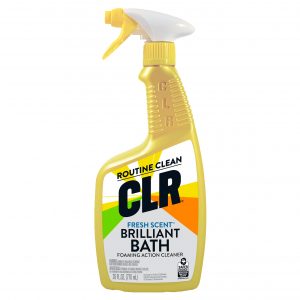 CLR® Brilliant Bath (Formerly Called CLR Bath and Kitchen) is one of the best commercial products for cleaning white tile and grout. It is not for colored grout or stone! You should not have stone in your shower or bathtub anyway – it deteriorates with water.
CLR® Brilliant Bath (Formerly Called CLR Bath and Kitchen) is one of the best commercial products for cleaning white tile and grout. It is not for colored grout or stone! You should not have stone in your shower or bathtub anyway – it deteriorates with water.